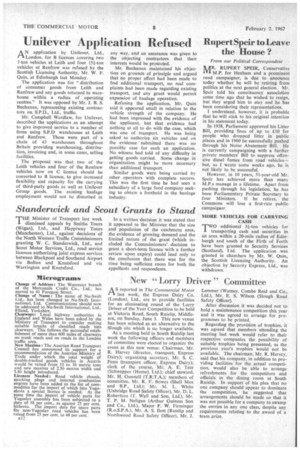Unilever Application Refused
Page 46

If you've noticed an error in this article please click here to report it so we can fix it.
AN application by Unilever, Ltd.. London, for B licences covering two 7-ton vehicles at Leith and four 153-ton vehicles at Renfrew was refused by the Scottish Licensing Authority, Mr. W. F. Quin, at Edinburgh last Monday.
The application was for " distribution of consumer goods from Leith and Renfrew and any goods returned to warehouse within a radius of operating centres." It was opposed by Mr. J. B. S. Buchanan, representing existing contractors on. S.P.D., Ltd., traffic.
Mr. Campbell Wardlaw, for Unilever, described the applications As an attempt to give improved service to a number of firms using S.P.D warehouses at Leith and Renfrew. These were part of a chain of 43 warehouses throughout Britain providing warehousing, distribution, invoicing and, in some cases, selling facilities.
The proposal was that two of the Leith vehicles and four of the Renfrew vehicles now on C licence should be converted to B licence, to give increased flexibility and capacity for the carrying of third-party goods as well as Unilever Group goods. The• existing haulage employment would not be disturbed in any way, and an assurance was given to the objecting contractors that their interests would be protected.
Mr. Buchanan maintained his objection on grounds of principle and argued that no proper effort had been made to find additional transport, no real complaints had been made regarding existing transport, and any grant would permit expansion of haulage operation.
Refusing the application, Mr. Quin said it appeared small in relation to the vehicle strength of the company. He had been impressed with the evidence of the applicant, but that evidence had nothing at all to do with the case, which was one of transport He was being asked to authorize six vehicles and on the evidencesubmitted there was no possible case for such an application. No witness had told of any difficulty in getting goods carried. Some change in organization might be more necessary than additional transport.
Similar goods were being carried by other operators with complete success. This was the first time he had seen a subsidiary of a large food company seeking to obtain a foothold in the haulage industry.




























































































































